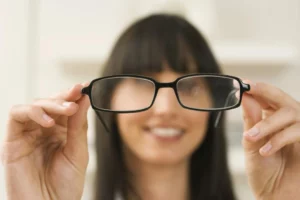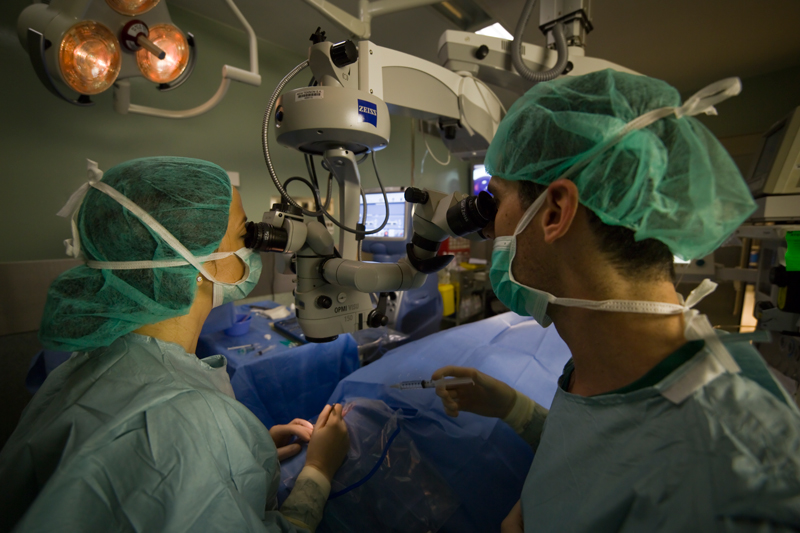Are you exhausted from continuously reaching for your glasses or struggling with contact lenses? Imagine a world where you can wake up and see clearly without any visual aids. Monovision PRK (Photorefractive Keratectomy) surgery offers a life-changing solution for those seeking visual freedom. In this blog post, we will explore the benefits, procedure, and recovery process of Monovision PRK, helping you make an informed decision about this revolutionary eye surgery.
Contents
What Is Monovision PRK Surgery?
 Monovision PRK (Photorefractive Keratectomy) surgery is a revolutionary procedure that corrects vision problems such as nearsightedness, farsightedness, and astigmatism. Unlike traditional PRK or LASIK surgeries, which aim to correct both eyes for distance vision, Monovision PRK intentionally corrects one eye for distance vision while leaving the other eye slightly nearsighted.
Monovision PRK (Photorefractive Keratectomy) surgery is a revolutionary procedure that corrects vision problems such as nearsightedness, farsightedness, and astigmatism. Unlike traditional PRK or LASIK surgeries, which aim to correct both eyes for distance vision, Monovision PRK intentionally corrects one eye for distance vision while leaving the other eye slightly nearsighted.
Monovision PRK offers numerous benefits, including enhanced visual freedom, reduced dependence on corrective eyewear, improved depth perception, and increased overall convenience. The procedure involves reshaping the cornea using an excimer laser, and the recovery process is relatively quick, with most patients experiencing improved vision within a few days to weeks. With Monovision PRK, individuals can enjoy the freedom of clear vision at various distances, making daily activities easier and more enjoyable.
How Does Monovision PRK Surgery Work?
 The Monovision PRK Surgery procedure consists of several key steps that work together to correct your vision and reduce your reliance on corrective eyewear.
The Monovision PRK Surgery procedure consists of several key steps that work together to correct your vision and reduce your reliance on corrective eyewear.
Let’s take a closer look at each of these steps:
- Preoperative Evaluation: Before experiencing Monovision PRK Surgery, you will have a complete eye examination to assess your eligibility for the approach. This evaluation will include measurements of your corneal thickness, pupil size, and overall eye health. Your surgeon will also evaluate your prescription and discuss your visual goals and expectations.
- Surgical Procedure: On the day of the surgery, your surgeon will administer local anesthesia to ensure your comfort throughout the process. They will then gently remove the epithelium using either a surgical instrument or an advanced laser. Once the epithelium has been removed, the excimer laser will reshape the cornea according to your unique prescription. The entire process is usually completed within a matter of minutes.
- Recovery Process: After the surgery, you will be given specific postoperative instructions to follow. It’s crucial to adhere to these guidelines to promote proper healing and minimize the risk of complications. During the initial days of recovery, you may experience some discomfort, dryness, and blurry vision. However, as the cornea gradually heals, your vision will improve, and any discomfort will subside.
The Benefits of Monovision PRK Surgery
 Undergoing Monovision PRK Surgery offers numerous benefits that can significantly enhance your quality of life while feeding you with a great vision.
Undergoing Monovision PRK Surgery offers numerous benefits that can significantly enhance your quality of life while feeding you with a great vision.
Let’s explore some of the advantages this innovative procedure has to offer:
- Reduced Dependence on Corrective Eyewear: By reshaping your cornea and rehabilitating your vision, Monovision PRK Surgery can decrease your dependence on glasses or contact lenses. This newfound visual freedom allows you to engage in activities without the hassle and inconvenience of constantly wearing corrective eyewear.
- Improved Visual Acuity: Monovision PRK Surgery aims to enhance your visual acuity, providing you with sharper and clearer vision. Whether you’re driving, reading, or enjoying outdoor activities, you’ll be able to see the world with newfound clarity and precision.
- Enhanced Depth Perception: One unique advantage of Monovision PRK Surgery is its ability to provide enhanced depth perception. With improved depth perception, you’ll be able to accurately judge distances, making activities such as driving and playing sports safer and more enjoyable.
- Versatility: Monovision PRK Surgery is a versatile procedure that can be tailored to suit your lifestyle and visual needs. Whether you prefer optimal distance vision or near vision, your surgeon can customize the treatment to achieve the desired outcome.
Who Is A Good Candidate For Monovision PRK Surgery?
 A good candidate for Monovision PRK (Photorefractive Keratectomy) surgery is typically considered 40 or older, and they also meet the following criteria:
A good candidate for Monovision PRK (Photorefractive Keratectomy) surgery is typically considered 40 or older, and they also meet the following criteria:
- Presbyopia: Individuals experiencing age-related presbyopia, a condition where the ability to focus on near objects diminishes, can benefit from Monovision PRK. It allows them to have a clear vision for both near and distant tasks without the need for reading glasses.
- Stable Refractive Error: Candidates should have a stable refractive error, meaning their vision prescription has remained relatively unchanged for at least one year. This stability ensures predictable outcomes from the surgery.
- Lifestyle Considerations: Candidates should carefully consider their lifestyle and visual needs. Monovision PRK is particularly suitable for individuals who engage in activities that require good near and distance vision, such as reading, driving, or using digital devices.
- Successful Trial with Monovision: Before undergoing the surgery, candidates may undergo a trial period with contact lenses simulating monovision. This allows them to experience and assess whether they can adapt to the visual imbalance and if they find it comfortable and satisfactory.
- Healthy Eyes: Candidates should have generally healthy eyes, free from any significant eye diseases or conditions that may interfere with the success of the procedure or the healing process.
It is essential to consult with an experienced eye care professional who can evaluate your individual circumstances, perform a comprehensive eye examination, and guide you in determining if Monovision PRK surgery is the right choice for you.
Limitations To Consider In Monovision PRK Surgery
 While Monovision PRK (Photorefractive Keratectomy) surgery offers numerous benefits, it is important to consider some limitations before opting for the procedure:
While Monovision PRK (Photorefractive Keratectomy) surgery offers numerous benefits, it is important to consider some limitations before opting for the procedure:
- Reduced Depth Perception: Monovision PRK intentionally creates a difference in vision between the eyes, which can result in reduced depth perception. Activities that require precise depth perception, such as certain sports or driving at night, may affect.
- Adaptation Period: It takes time for the brain to adjust to the new visual imbalance created by Monovision PRK. Some individuals may experience a period of adaptation. During this, they may notice differences in visual clarity or balance between the eyes.
- Compromised Visual Acuity: Monovision PRK provides a clear vision for both near and distance tasks. The level of visual acuity may slightly compromise in each eye compared to fully corrected vision achieved with traditional PRK or LASIK procedures.
- Potential Need for Visual Correction: Although Monovision PRK aims to reduce dependence on glasses or contact lenses, some individuals may still require vision correction for certain activities or specific visual tasks that demand optimal visual acuity.
- Personal Preference: Monovision PRK may not be suitable for everyone, as individual preferences and lifestyle factors play a significant role. It is important to discuss your specific visual needs and expectations with a qualified eye care professional to determine if Monovision PRK is the right choice for you.
Considering these limitations will help individuals make an informed decision regarding Monovision PRK surgery. While ensuring realistic expectations for their post-operative visual experience.
Conclusion
Monovision PRK Surgery offers a transformative solution for individuals seeking to correct their vision. That reduces their reliance on corrective eyewear. This innovative procedure, performed by skilled eye surgeons, can provide improved visual acuity. While enhancing depth perception, and a significant reduction in the need for glasses or contact lenses. While there are potential risks and side effects associated with Monovision PRK Surgery, the majority of patients experience successful outcomes. At the time of enjoying, the benefits of clear, unaided vision. So, if you’re ready to bid farewell to the limitations of traditional corrective eyewear and embrace a life of visual freedom, consider exploring Monovision PRK Surgery as a viable option.
Lasik surgery is a safe 10-minute procedure to help you get rid of glasses. EyeMantra offers the most advanced LASIK options including PRK, Femto Lasik, SMILE surgery, Standard LASIK, ICL, and Contoura vision. If you have any questions on Lasik surgery in Delhi, Lasik surgery cost, and Lasik procedure, call us at 9711116605 or email at [email protected].



buying prescription drugs in mexico: cmq mexican pharmacy online – pharmacies in mexico that ship to usa
buying prescription drugs in mexico online
https://cmqpharma.com/# medication from mexico pharmacy
buying prescription drugs in mexico online
canadian pharmacy sarasota: best canadian pharmacy to buy from – canadian pharmacy online reviews
pet meds without vet prescription canada canada rx pharmacy legitimate canadian pharmacy
http://indiapharmast.com/# world pharmacy india
buy medicines online in india: top online pharmacy india – indian pharmacy online
reliable canadian online pharmacy: legitimate canadian mail order pharmacy – canadian pharmacy king
canada rx pharmacy pharmacy rx world canada canadian drugs online
https://indiapharmast.com/# top 10 pharmacies in india
canadian pharmacy 24 com: canadian pharmacy online – canadian compounding pharmacy
canadadrugpharmacy com [url=https://canadapharmast.online/#]canadian pharmacy ltd[/url] canadian drugs pharmacy
mexican mail order pharmacies: mexican rx online – mexican pharmacy
https://canadapharmast.online/# cheapest pharmacy canada
buying from canadian pharmacies canada discount pharmacy canadian pharmacy
https://amoxildelivery.pro/# buy cheap amoxicillin online
amoxicillin price canada: amoxicillin 30 capsules price – amoxicillin generic
http://doxycyclinedelivery.pro/# doxycycline cheap
order generic clomid: how can i get clomid no prescription – how to get generic clomid pills
https://paxloviddelivery.pro/# paxlovid pill
https://clomiddelivery.pro/# where to buy generic clomid no prescription
п»їpaxlovid: paxlovid price – paxlovid cost without insurance
https://ciprodelivery.pro/# cipro 500mg best prices
https://doxycyclinedelivery.pro/# doxcyclene
buy doxycycline capsules: doxycycline capsules price in india – doxycycline 400 mg tablet
https://clomiddelivery.pro/# can you buy clomid no prescription
get cheap clomid: clomid cost – how can i get cheap clomid no prescription
https://paxloviddelivery.pro/# Paxlovid buy online
http://paxloviddelivery.pro/# paxlovid for sale
buy paxlovid online: paxlovid for sale – paxlovid price
doxycycline online sale: can i buy 40mg doxycycline online – doxycycline 100 mg buy online
how to get doxycycline prescription: buy doxycycline online nz – doxy 200